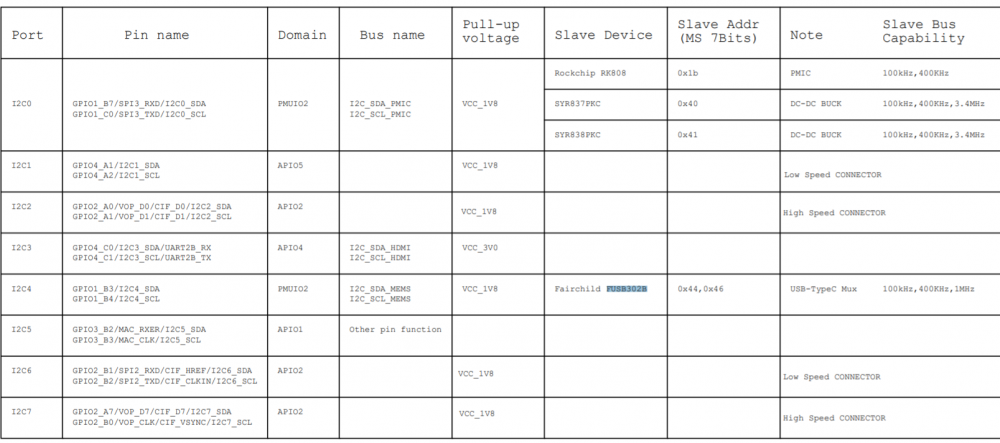Search the Community
Showing results for tags 'rockpi-4b'.
-
After bootup I get # systemd-analyze Bootup is not yet finished. Please try again later. # systemctl list-jobs JOB UNIT TYPE STATE 142 systemd-update-utmp-runlevel.service start waiting 114 rk3399-bluetooth.service start running 1 multi-user.target start waiting If I stop rk3399-bluetooth.service everything completes and list-jobs is clean, but then bluetooth stops working. I've tried a few things in the rk3399-bluetooth unit file but so far I've not been able to find a way to make systemd happy and finish cleanly. By the way, in the service file it uses "--use_baudrate_for_downloade", typo and should be "--use_baudrate_for_download"
-
Hi I’m running now armbian 19.11.7 buster with kernel 5.4.8, and using a using a HP EX900 250GB NVMe. I used to have transfer nvme speeds around 400-500 MBps with radxa stretch linux 4.4 (and 700ish on pcie gen 2) In armbian it seems that the transfer rate is around half: raleonardo@rockpi:~$ sudo hdparm -t --direct /dev/nvme0n1 /dev/nvme0n1: HDIO_DRIVE_CMD(identify) failed: Inappropriate ioctl for device Timing O_DIRECT disk reads: 590 MB in 3.01 seconds = 196.11 MB/sec with overlays=pcie-gen2: raleonardo@rockpi:~$ sudo hdparm -t --direct /dev/nvme0n1 /dev/nvme0n1: HDIO_DRIVE_CMD(identify) failed: Inappropriate ioctl for device Timing O_DIRECT disk reads: 1140 MB in 3.00 seconds = 379.61 MB/sec I wonder if anybody else has similar issues, and if this anyway related with different kernel drivers in 5.x vs 4.4 ?
-
Hello, I have read some threats with the same issue, armbian images are not booting, there is not HDMI signal when turn on rockpi4. General solution is trying armbian image stored on radxa server https://dl.radxa.com/rockpi/images/third-party/Armbian_5.67_Rockpi4b_Debian_stretch_default_4.4.154_desktop_20181210-gpt.img.gz this armbian version works fine but it's too old, also i'm interested to use latest armbian-ubuntu-bionic My case: I have a new rockpi4b 1.4v, not eMMC module, I have flashed several armbian versions on sdCard : https://dl.armbian.com/rockpi-4b/Bionic_legacy_desktop https://dl.armbian.com/rockpi-4b/Buster_legacy https://dl.armbian.com/rockpi-4b/Buster_current_desktop https://dl.armbian.com/rockpi-4b/Bionic_current_minimal .. and old versions archived None of them works! the issue is the same, not HDMI signal. I can boot fine using radxa images (armbian stretch and others OS stored there). Is possible something wrong on latest rockpi4 hardware and need a fix on armbian/uBoot configuration?
-
Started to test Armbian_19.11.5_Rockpi-4b_buster_current_5.4.6.img and I could not boot off of the eMMC. So I put Armbian_19.11.5_Rockpi-4b_buster_current_5.4.6.img on an SD card and formatted my eMMC. I was then able to get the Rock Pi 4 to boot successfully. It looks like the kernel can not initialize the eMMC. Here are some messages from dmesg on boot: [ 53.338988] dwmmc_rockchip fe310000.dwmmc: IDMAC supports 32-bit address mode. [ 53.339028] dwmmc_rockchip fe310000.dwmmc: Using internal DMA controller. [ 53.339048] dwmmc_rockchip fe310000.dwmmc: Version ID is 270a [ 53.339126] dwmmc_rockchip fe310000.dwmmc: DW MMC controller at irq 28,32 bit host data width,256 deep fifo [ 53.339411] dwmmc_rockchip fe310000.dwmmc: allocated mmc-pwrseq [ 53.339426] mmc_host mmc0: card is non-removable. [ 53.351589] mmc_host mmc0: Bus speed (slot 0) = 400000Hz (slot req 400000Hz, actual 400000HZ div = 0) [ 53.364798] dwmmc_rockchip fe320000.dwmmc: IDMAC supports 32-bit address mode. [ 53.364825] dwmmc_rockchip fe320000.dwmmc: Using internal DMA controller. [ 53.364840] dwmmc_rockchip fe320000.dwmmc: Version ID is 270a [ 53.364898] dwmmc_rockchip fe320000.dwmmc: DW MMC controller at irq 29,32 bit host data width,256 deep fifo [ 53.365040] dwmmc_rockchip fe320000.dwmmc: Got CD GPIO [ 53.377851] mmc_host mmc1: Bus speed (slot 0) = 400000Hz (slot req 400000Hz, actual 400000HZ div = 0) [ 53.393119] mmc2: CQHCI version 5.10 [ 53.399037] mmc0: queuing unknown CIS tuple 0x80 (2 bytes) [ 53.400631] mmc0: queuing unknown CIS tuple 0x80 (3 bytes) [ 53.402215] mmc0: queuing unknown CIS tuple 0x80 (3 bytes) [ 53.405068] mmc0: queuing unknown CIS tuple 0x80 (7 bytes) [ 53.408569] mmc0: queuing unknown CIS tuple 0x81 (9 bytes) [ 53.417703] mmc2: SDHCI controller on fe330000.sdhci [fe330000.sdhci] using ADMA [ 53.427277] mmc_host mmc1: Bus speed (slot 0) = 50000000Hz (slot req 50000000Hz, actual 50000000HZ div = 0) [ 53.427416] mmc1: new high speed SDHC card at address 0001 [ 53.432073] mmcblk1: mmc1:0001 00000 7.41 GiB [ 53.434118] mmcblk1: p1 [ 53.463648] mmc_host mmc0: Bus speed (slot 0) = 148500000Hz (slot req 150000000Hz, actual 148500000HZ div = 0) [ 53.515437] mmc2: mmc_select_hs400es failed, error -84 [ 53.515446] mmc2: error -84 whilst initialising MMC card [ 53.599556] dwmmc_rockchip fe310000.dwmmc: Successfully tuned phase to 224 [ 53.601739] mmc0: new ultra high speed SDR104 SDIO card at address 0001 [ 53.637621] mmc2: mmc_select_hs400es failed, error -84 [ 53.637632] mmc2: error -84 whilst initialising MMC card [ 53.777039] mmc2: mmc_select_hs400es failed, error -110 [ 53.777059] mmc2: error -110 whilst initialising MMC card [ 53.968760] mmc2: mmc_select_hs400es failed, error -110 [ 53.968777] mmc2: error -110 whilst initialising MMC card I brought this up in the Raxda forum: https://forum.radxa.com/t/armbian-buster-5-4-6-emmc-slot-not-being-detected/2422/2 and it was suggested to switch to hs200. I made the following modifications to the dtb like below on a freshly imaged eMMC: diff --git a/arch/arm64/boot/dts/rockchip/rk3399-rock-pi-4.dts b/arch/arm64/boot/dts/rockchip/rk3399-rock-pi-4.dts index 1ae1ebd4efdd..5ea6286e5faa 100644 --- a/arch/arm64/boot/dts/rockchip/rk3399-rock-pi-4.dts +++ b/arch/arm64/boot/dts/rockchip/rk3399-rock-pi-4.dts @@ -592,8 +592,7 @@ &sdhci { bus-width = <8>; - mmc-hs400-1_8v; - mmc-hs400-enhanced-strobe; + mmc-hs200-1_8v; non-removable; status = "okay"; }; This works, though hs400 seemed to be working on the Kernel 4.4 and I also see posts in this forum that suggests it was possibly working on 5.3.y? I reviewed the kernel docs for ../5.4.y/Documentation/devicetree/bindings/mmc/mmc-controller.yaml, though to be honest I'm a little out of my depth on proper configuration and if there are currently config issues preventing the eMMC from being initialized properly. My next step are to try and setup the build environment and figure out how to build 5.3.y branch to see if eMMC was working off of that branch? If anyone could confirm booting off of eMMC on 5.3.y that would be helpful, as then I could start a git bisect in the kernel source to try and figure out what commit broke support. Any further advice for someone more experienced with these SoC boards would be appreciated.
-
Is there a reason this is turned off? From linux-rockchip64-current.config: # # CD-ROM/DVD Filesystems # # CONFIG_ISO9660_FS is not set # CONFIG_UDF_FS is not set # end of CD-ROM/DVD Filesystems Whereas most other configs have this enabled as modules. For example, in linux-sunxi64-current.config: # # CD-ROM/DVD Filesystems # CONFIG_ISO9660_FS=m CONFIG_JOLIET=y # CONFIG_ZISOFS is not set CONFIG_UDF_FS=m # end of CD-ROM/DVD Filesystems
-
Hi, I am using Armbian_19.11.3_Rockpi-4b_buster_current_5.3.11_desktop. Facing issue when trying to use USB devices in the upper USB 3 port on a Rock Pi 4 v1.3. This port also supports USB OTG. The switch is set to Host mode. The storage is detected occasionally, while most of the time it does not work. dmesg contains no reference to the connected storage: $ dmesg | grep usb [ 0.000000] Kernel command line: root=UUID=590fca6f-9771-4245-86a7-34712bfe535b rootwait rootfstype=ext4 console=ttyS2,1500000 console=tty1 panic=10 consoleblank=0 loglevel=1 ubootpart=7ef2aff3-01 usb-storage.quirks=0x2537:0x1066:u,0x2537:0x1068:u cgroup_enable=cpuset cgroup_memory=1 cgroup_enable=memory swapaccount=1 [ 5.284733] usbcore: registered new interface driver usbfs [ 5.287156] usbcore: registered new interface driver hub [ 5.292587] usbcore: registered new device driver usb [ 50.127245] usbcore: registered new interface driver pegasus [ 50.129170] usbcore: registered new interface driver rtl8150 [ 50.132096] usbcore: registered new interface driver r8152 [ 50.134404] usbcore: registered new interface driver dm9601 [ 50.136578] usbcore: registered new interface driver CoreChips [ 50.139442] usbcore: registered new interface driver smsc75xx [ 50.141440] usbcore: registered new interface driver smsc95xx [ 50.143765] usbcore: registered new interface driver plusb [ 50.145608] usbcore: registered new interface driver MOSCHIP usb-ethernet driver [ 50.374451] ehci-platform fe380000.usb: EHCI Host Controller [ 50.375497] ehci-platform fe380000.usb: new USB bus registered, assigned bus number 1 [ 50.381185] ehci-platform fe380000.usb: irq 31, io mem 0xfe380000 [ 50.395266] ehci-platform fe380000.usb: USB 2.0 started, EHCI 1.00 [ 50.408238] usb usb1: New USB device found, idVendor=1d6b, idProduct=0002, bcdDevice= 5.03 [ 50.408790] usb usb1: New USB device strings: Mfr=3, Product=2, SerialNumber=1 [ 50.409190] usb usb1: Product: EHCI Host Controller [ 50.409557] usb usb1: Manufacturer: Linux 5.3.11-rockchip64 ehci_hcd [ 50.410635] usb usb1: SerialNumber: fe380000.usb [ 50.468500] ehci-platform fe3c0000.usb: EHCI Host Controller [ 50.469493] ehci-platform fe3c0000.usb: new USB bus registered, assigned bus number 2 [ 50.475359] ehci-platform fe3c0000.usb: irq 33, io mem 0xfe3c0000 [ 50.491432] ehci-platform fe3c0000.usb: USB 2.0 started, EHCI 1.00 [ 50.501308] usb usb2: New USB device found, idVendor=1d6b, idProduct=0002, bcdDevice= 5.03 [ 50.502470] usb usb2: New USB device strings: Mfr=3, Product=2, SerialNumber=1 [ 50.502888] usb usb2: Product: EHCI Host Controller [ 50.503283] usb usb2: Manufacturer: Linux 5.3.11-rockchip64 ehci_hcd [ 50.503650] usb usb2: SerialNumber: fe3c0000.usb [ 50.585291] ohci-platform fe3a0000.usb: Generic Platform OHCI controller [ 50.587119] ohci-platform fe3a0000.usb: new USB bus registered, assigned bus number 3 [ 50.592909] ohci-platform fe3a0000.usb: irq 32, io mem 0xfe3a0000 [ 50.664813] usb usb3: New USB device found, idVendor=1d6b, idProduct=0001, bcdDevice= 5.03 [ 50.665289] usb usb3: New USB device strings: Mfr=3, Product=2, SerialNumber=1 [ 50.666380] usb usb3: Product: Generic Platform OHCI controller [ 50.666764] usb usb3: Manufacturer: Linux 5.3.11-rockchip64 ohci_hcd [ 50.667113] usb usb3: SerialNumber: fe3a0000.usb [ 50.720807] ohci-platform fe3e0000.usb: Generic Platform OHCI controller [ 50.722470] ohci-platform fe3e0000.usb: new USB bus registered, assigned bus number 4 [ 50.728607] ohci-platform fe3e0000.usb: irq 34, io mem 0xfe3e0000 [ 50.799943] usb usb4: New USB device found, idVendor=1d6b, idProduct=0001, bcdDevice= 5.03 [ 50.800404] usb usb4: New USB device strings: Mfr=3, Product=2, SerialNumber=1 [ 50.800802] usb usb4: Product: Generic Platform OHCI controller [ 50.801176] usb usb4: Manufacturer: Linux 5.3.11-rockchip64 ohci_hcd [ 50.801528] usb usb4: SerialNumber: fe3e0000.usb [ 50.897341] usbcore: registered new interface driver usb-storage [ 52.303330] usbcore: registered new interface driver usbhid [ 52.303335] usbhid: USB HID core driver [ 53.090803] OF: graph: no port node found in /syscon@ff770000/usb2-phy@e450/otg-port [ 53.093318] usb usb5: New USB device found, idVendor=1d6b, idProduct=0002, bcdDevice= 5.03 [ 53.093324] usb usb5: New USB device strings: Mfr=3, Product=2, SerialNumber=1 [ 53.093329] usb usb5: Product: xHCI Host Controller [ 53.093334] usb usb5: Manufacturer: Linux 5.3.11-rockchip64 xhci-hcd [ 53.093338] usb usb5: SerialNumber: xhci-hcd.0.auto [ 53.095135] usb usb6: We don't know the algorithms for LPM for this host, disabling LPM. [ 53.095238] usb usb6: New USB device found, idVendor=1d6b, idProduct=0003, bcdDevice= 5.03 [ 53.095244] usb usb6: New USB device strings: Mfr=3, Product=2, SerialNumber=1 [ 53.095249] usb usb6: Product: xHCI Host Controller [ 53.095253] usb usb6: Manufacturer: Linux 5.3.11-rockchip64 xhci-hcd [ 53.095257] usb usb6: SerialNumber: xhci-hcd.0.auto [ 53.100145] usb usb7: New USB device found, idVendor=1d6b, idProduct=0002, bcdDevice= 5.03 [ 53.100150] usb usb7: New USB device strings: Mfr=3, Product=2, SerialNumber=1 [ 53.100155] usb usb7: Product: xHCI Host Controller [ 53.100160] usb usb7: Manufacturer: Linux 5.3.11-rockchip64 xhci-hcd [ 53.100164] usb usb7: SerialNumber: xhci-hcd.1.auto [ 53.101778] usb usb8: We don't know the algorithms for LPM for this host, disabling LPM. [ 53.101822] usb usb8: New USB device found, idVendor=1d6b, idProduct=0003, bcdDevice= 5.03 [ 53.101825] usb usb8: New USB device strings: Mfr=3, Product=2, SerialNumber=1 [ 53.101828] usb usb8: Product: xHCI Host Controller [ 53.101830] usb usb8: Manufacturer: Linux 5.3.11-rockchip64 xhci-hcd [ 53.101833] usb usb8: SerialNumber: xhci-hcd.1.auto [ 54.194069] usb 8-1: new SuperSpeed Gen 1 USB device number 2 using xhci-hcd [ 54.219860] usb 8-1: New USB device found, idVendor=8564, idProduct=1000, bcdDevice=11.00 [ 54.219871] usb 8-1: New USB device strings: Mfr=1, Product=2, SerialNumber=3 [ 54.219878] usb 8-1: Product: Mass Storage Device [ 54.219885] usb 8-1: Manufacturer: JetFlash [ 54.219892] usb 8-1: SerialNumber: 72Z6UO7B9R2GAU45 [ 54.221852] usb-storage 8-1:1.0: USB Mass Storage device detected [ 54.223204] scsi host0: usb-storage 8-1:1.0 [ 54.228901] usbcore: registered new interface driver uas [ 59.801887] phy phy-ff770000.syscon:usb2-phy@e450.2: charger = USB_DCP_CHARGER It works with the Radxa Debian Stretch image with Linux 4.4.154-99-rockchip-g5b699a48544d: [ 3.117507] rockchip-dwc3 usb0: USB HOST connected [ 3.426644] usb 8-1: new SuperSpeed USB device number 2 using xhci-hcd [ 3.444057] usb 8-1: New USB device found, idVendor=0080, idProduct=a001 [ 3.444673] usb 8-1: New USB device strings: Mfr=1, Product=2, SerialNumber=3 [ 3.445322] usb 8-1: Product: External USB 3.0 [ 3.445735] usb 8-1: Manufacturer: TOSHIBA [ 3.446113] usb 8-1: SerialNumber: 201503310007F [ 4.138675] usb 7-1: new SuperSpeed USB device number 2 using xhci-hcd [ 4.160143] usb 7-1: New USB device found, idVendor=8564, idProduct=1000 [ 4.160746] usb 7-1: New USB device strings: Mfr=1, Product=2, SerialNumber=3 [ 4.161370] usb 7-1: Product: Mass Storage Device [ 4.161788] usb 7-1: Manufacturer: JetFlash [ 4.162159] usb 7-1: SerialNumber: 72Z6UO7B9R2GAU45 [ 4.420405] usb-storage 7-1:1.0: USB Mass Storage device detected [ 4.430414] scsi host0: usb-storage 7-1:1.0 [ 4.431253] usbcore: registered new interface driver usb-storage [ 4.438119] usbcore: registered new interface driver uas So I am guessing its a kernel issue. Thanks for your work.
-
Hello, is it possible to install WiringPi on Rock Pi 4? I tried to install WiringX using the instructions on https://github.com/wiringX/wiringX , but after installing it the command "gpio" is not present. Any hint on how to get "gpio" command on Rock Pi 4? Thanks
-
Hello, ttyS2 is used for console output by default. In my application I need this port for custom communication. Is there any way to disable the console on it? Thanks
-
Hi, Tested the current build (Armbian_19.11.3_Rockpi-4b_buster_current_5.3.11_desktop.7z) on a Rock Pi 4 v1.3. Working well so far the past couple of hours. Its an amazing feeling to be able to run the mainline kernel with so little issues. Some minor things: The Red Led keeps on blinking with this build. Earlier it only blinked if there was error while booting. New to this board, so this maybe incorrect. I booted up Radxa image and there also red light was blinking. Sound via 3.5 mm jack not working. Inserted earphone, no output. Sound via HDMI works. Thanks for your work. Edit- System info: aaditya@rockpi:~$ inxi -Fxz System: Host: rockpi Kernel: 5.3.11-rockchip64 aarch64 bits: 64 compiler: gcc v: 8.3.0 Desktop: Xfce 4.12.4 Distro: Armbian GNU/Linux 10 (buster) Machine: Type: ARM Device System: Radxa ROCK Pi 4 details: N/A serial: <filter> CPU: Topology: 6-Core (2-Die) model: N/A variant-1: cortex-a53 variant-2: cortex-a72 bits: 64 type: MCP MCM arch: ARMv8 rev: 4 features: Use -f option to see features bogomips: 0 Speed: 1800 MHz min/max: 408/1512:2016 MHz Core speeds (MHz): 1: 408 2: 408 3: 408 4: 408 5: 1800 6: 1800 Graphics: Device-1: display-subsystem driver: rockchip_drm v: N/A bus ID: N/A Device-2: rk3399-dw-hdmi driver: dwhdmi_rockchip v: N/A bus ID: N/A Device-3: rk3399-mali driver: panfrost v: kernel bus ID: N/A Display: x11 server: X.Org 1.20.4 driver: modesetting unloaded: fbdev resolution: 1920x1080~60Hz OpenGL: renderer: llvmpipe (LLVM 7.0 128 bits) v: 3.3 Mesa 18.3.6 direct render: Yes Audio: Device-1: rk3399-dw-hdmi driver: dwhdmi_rockchip bus ID: N/A Device-2: simple-audio-card driver: asoc_simple_card bus ID: N/A Sound Server: ALSA v: k5.3.11-rockchip64 Network: Device-1: rk3399-gmac driver: rk_gmac_dwmac v: N/A port: N/A bus ID: N/A IF: eth0 state: down mac: <filter> IF-ID-1: dummy0 state: down mac: <filter> IF-ID-2: wlan0 state: up mac: <filter> Drives: Local Storage: total: 44.52 GiB used: 15.60 GiB (35.1%) ID-1: /dev/mmcblk1 model: EB1QT size: 29.81 GiB ID-2: /dev/sda type: USB vendor: Transcend model: JetFlash Transcend 16GB size: 14.70 GiB Partition: ID-1: / size: 28.98 GiB used: 3.16 GiB (10.9%) fs: ext4 dev: /dev/mmcblk1p1 ID-2: /var/log size: 48.4 MiB used: 4.2 MiB (8.6%) fs: ext4 dev: /dev/zram0 Sensors: Missing: Required tool sensors not installed. Check --recommends Info: Processes: 183 Uptime: 6m Memory: 3.78 GiB used: 534.1 MiB (13.8%) Init: systemd Compilers: gcc: 8.3.0 Shell: bash v: 5.0.3 inxi: 3.0.32 dmesg attached. dmesg-armbian-buster-current-rockpi4.txt
-
Hi, I just bought a Rock Pi4B v1.4 recently. I tried to boot it with https://dl.armbian.com/rockpi-4b/Debian_buster_default_desktop.7z and https://dl.armbian.com/rockpi-4b/Ubuntu_bionic_default_desktop.7z However it was all in vain. I also had tried SDCard and emmc but none of them worked. Any suggestion? Thanks
-
Hello, i'm experiencing random reboots on my RockPi 4b. I firstly recognoized this when my Squid Proxy Server was not working anymore because it had no permissions to its var/log/squid directory. What i saw (lsblk) that /var/log/ is only of a size of 50mb. Will that be the cause for the reboots? Does the system crash when the logs are full? My System is a Rock Pi 4b with 32gb emmc storage. Debian Stretch with Armbian Linux 4.4.192-rockchip64 Armbian Release 5.90 (i dont know how to change to the next version as armbian-config does not provide the switch to next button) Output or Armbianmonitor -u http://ix.io/22oZ
-
I would like to enable SPI on RockPi4, but I don't know how. Further I did a list of I2C devices, also I can't figure out where those I2C devices are suppposed to be: pi@rockpi:~$ sudo sudo i2cdetect -l i2c-0 i2c rk3x-i2c I2C adapter i2c-1 i2c rk3x-i2c I2C adapter i2c-2 i2c rk3x-i2c I2C adapter i2c-4 i2c rk3x-i2c I2C adapter i2c-7 i2c rk3x-i2c I2C adapter i2c-9 i2c DesignWare HDMI I2C adapter This is I2C map from schematics: Note, the listing is different: 0, 1, 2, 4, 7, 9 VS. 0, 1, 2, 3, 4, 6, 7 from schematics. Now probing: pi@rockpi:~$ sudo i2cdetect -y 0 0 1 2 3 4 5 6 7 8 9 a b c d e f 00: -- -- -- -- -- -- -- -- -- -- -- -- -- 10: -- -- -- -- -- -- -- -- -- -- -- UU -- -- -- -- 20: -- -- -- -- -- -- -- -- -- -- -- -- -- -- -- -- 30: -- -- -- -- -- -- -- -- -- -- -- -- -- -- -- -- 40: UU UU -- -- -- -- -- -- -- -- -- -- -- -- -- -- 50: -- -- -- -- -- -- -- -- -- -- -- -- -- -- -- -- 60: -- -- -- -- -- -- -- -- -- -- -- -- -- -- -- -- 70: -- -- -- -- -- -- -- -- This one is correct 0x40, 0x41, 0x1b shall be used by system pi@rockpi:~$ sudo i2cdetect -y 1 0 1 2 3 4 5 6 7 8 9 a b c d e f 00: -- -- -- -- -- -- -- -- -- -- -- -- -- 10: -- UU -- -- -- -- -- -- -- -- -- -- -- -- -- -- 20: -- -- -- -- -- -- -- -- -- -- -- -- -- -- -- -- 30: -- -- -- -- -- -- -- -- -- -- -- -- -- -- -- -- 40: -- -- -- -- -- -- -- -- -- -- -- -- -- -- -- -- 50: -- -- -- -- -- -- -- -- -- -- -- -- -- -- -- -- 60: -- -- -- -- -- -- -- -- -- -- -- -- -- -- -- -- 70: -- -- -- -- -- -- -- -- 0x11 Not in the map, possibly audio IC from schematics - ES8316? pi@rockpi:~$ sudo i2cdetect -y 9 0 1 2 3 4 5 6 7 8 9 a b c d e f 00: -- -- -- -- -- -- -- -- -- -- -- -- -- 10: -- -- -- -- -- -- -- -- -- -- -- -- -- -- -- -- 20: -- -- -- -- -- -- -- -- -- -- -- -- -- -- -- -- 30: 30 -- -- -- -- -- -- -- -- -- -- -- -- -- -- -- 40: -- -- -- -- -- -- -- -- -- -- -- -- -- -- -- -- 50: -- -- -- -- -- -- -- -- -- -- -- -- -- -- -- -- 60: -- -- -- -- -- -- -- -- -- -- -- -- -- -- -- -- 70: -- -- -- -- -- -- -- -- 0x30 is not in the map. FUSB302B chip in the map 0x44, 0x46 doesn't exist? I would like to use I2C_7 GPIO2_A7/VOP_D7/CIF_D7/I2C7_SDA and GPIO2_B0/VOP_CLK/CIF_VSYNC/I2C7_SCL these are located on RPI header pin 3,5 ; which I2C device is this? How to enable SPI device? I wold like to connect a SPI slave on RPI header - same SPI channel as SPI flash which is not mounted. EDIT: pi@rockpi:~$ sudo i2cdetect -y 7 0 1 2 3 4 5 6 7 8 9 a b c d e f 00: -- -- -- -- -- -- -- -- -- -- -- -- -- 10: -- -- -- -- -- -- -- -- -- -- -- -- -- -- -- -- 20: -- -- -- -- -- -- -- -- -- -- -- -- -- -- -- -- 30: -- -- -- -- -- -- -- -- 38 -- -- -- -- -- -- -- 40: -- -- -- -- -- -- -- -- -- -- -- -- -- -- -- -- 50: -- -- -- -- -- -- -- -- -- -- -- -- -- -- -- -- 60: -- -- -- -- -- -- -- -- 68 -- -- -- -- -- -- -- 70: -- -- -- -- -- -- -- -- OK, these are devices connected on RPI header I2C7.
-
Hi, I am running " Linux server 5.1.0-rockchip64 #5.89 SMP Fri Jun 21 13:42:34 CEST 2019 aarch64 GNU/Linux " and trying to switch off the green light somewhere at " /sys/class/leds/power ", but was unable to find the proper setting to switch it off. Anyone can give me a hand please? cheers
-
My board is rockpi4b After starting, unplug or restart the display, the display will display armbian desktop directly, indicating that armbian is started normally, but there is no normal signal to the display.After restarting, you must switch the monitor power or unplug the hdmi cable to display. This is not a problem if you use the official debian of rock and the armbian5.67 downloaded from rock's official website. And i want to use gpio lib in armbian such as libmraa ,how should i do?
-
Hi there, I'd like to point out that the armbian buster (Armbian_5.90_Rockpi-4b_Debian_buster_default_4.4.182_desktop) and armbian bionic images are not booting on the rockpi 4b at this time. I've tried both etcher and win32disk imager. The armbian stretch image is booting just fine (ruling out SD and usb-C power issues i guess ?) I've searched the forum and have not found a mention of his, therefore I'd like to do this now. I unfortunatly don't know how to record boot messages at this time. If anyone is able to provide a quide to this I'd be happy to record the messages. The guides I've found so far are unfortunatly very confusing to me. The only information I'm able to provide at this time is that im seeing the green light of the rockpi combined with two quick red flashes. Just out of interest, are these most likely issues from the implementation of the new debian buster version (and will thus most likely be solved quickly ?) or is this a broader issue with the rockpi RK3399? I know no one can't answer these questions due to the lack of data, but I'd like to know what your engineering intuition sais. Thank you.
-
The buster image boots up, and has both Ethernet and Wifi devices enabled. But no IP packets leave or reach the board, trying both dhcp or static setup, on ipv4 and ipv6. Ping shows destination unreachable msgs. Eth0 interface shows up in desktop GUI as well as armbian-config tool and with ip interface command Switching to an eMMC with bionic image works fine.
-
I just installed Armbian 5.88 for Rock Pi 4B and bluetooth is not working. I'm using ARMBIAN 5.88 stable Debian GNU/Linux 9 (stretch) 4.4.180-rockchip64 Do you need further information? Got it working without compiling the new kernel. i manually ran the last steps of https://github.com/armbian/build/blob/master/config/sources/rockchip64.conf and copied rk3399-bluetooth.service and brcm_patchram_plus_rk3399 onto the device and set up the service... after a reboot Bluetooth is working fine. Thats great!
-
I have the following hat http://wiki.seeedstudio.com/Raspberry_Pi_Relay_Board_v1.0 my image detects the i2c interfaces and mounts them in /dev as i2c-0 i2c-1 i2c-3 i2c-4, I can scan the different i2c interfaces as folloging interface i2cdetect -y 1 root@rockpi:~# i2cdetect -y 1 0 1 2 3 4 5 6 7 8 9 a b c d e f 00: -- -- -- -- -- -- -- -- -- -- -- -- -- 10: UU 11 -- -- -- -- -- -- -- -- -- -- -- -- -- -- 20: -- -- -- -- -- -- -- -- -- -- -- -- -- -- -- -- 30: -- -- -- -- -- -- -- -- -- -- -- -- -- -- -- -- 40: -- -- -- -- -- -- -- -- -- -- -- -- -- -- -- -- 50: -- -- -- -- -- -- -- -- -- -- -- -- -- -- -- -- 60: -- -- -- -- -- -- -- -- -- -- -- -- -- -- -- -- 70: -- -- -- -- -- -- -- -- I have set 0x20 address on my relay Board but cannot see the interface. Has anyone a hint what configuration settings i need to change Many Thanks Roman
-
Hello, I'm trying to activate the uart interface Gpio 8 + 10 on the rock pi4. I have currently installed the image of radxa. --> ARMBIAN 5.67 user-built Debian GNU/Linux 9 (stretch) 4.4.154-rk3399rockpi4b My Linux knowledge is still in the beginning. Who can help me to activate the upart interface Gpio 8 + 10 on the rock pi4. Thank you
-
I am attempting to use an arduino uno on a rockpi4 using armbian. The device is connecting but not bringing up /dev/ttyusb0. uname -a Linux rockpi4b 4.4.154-rk3399rockpi4b #26 SMP Mon Dec 10 09:26:20 CST 2018 aarch64 GNU/Linux dmesg [ 98.230808] usb 7-1: new full-speed USB device number 3 using xhci-hcd [ 98.346089] usb 7-1: New USB device found, idVendor=1a86, idProduct=7523 [ 98.346115] usb 7-1: New USB device strings: Mfr=0, Product=2, SerialNumber=0 [ 98.346130] usb 7-1: Product: USB2.0-Serial lsusb -t /: Bus 08.Port 1: Dev 1, Class=root_hub, Driver=xhci-hcd/1p, 5000M /: Bus 07.Port 1: Dev 1, Class=root_hub, Driver=xhci-hcd/1p, 480M |__ Port 1: Dev 4, If 0, Class=Vendor Specific Class, Driver=, 12M /: Bus 06.Port 1: Dev 1, Class=root_hub, Driver=xhci-hcd/1p, 5000M /: Bus 05.Port 1: Dev 1, Class=root_hub, Driver=xhci-hcd/1p, 480M /: Bus 04.Port 1: Dev 1, Class=root_hub, Driver=ohci-platform/1p, 12M /: Bus 03.Port 1: Dev 1, Class=root_hub, Driver=ohci-platform/1p, 12M |__ Port 1: Dev 2, If 0, Class=Human Interface Device, Driver=usbhid, 12M |__ Port 1: Dev 2, If 1, Class=Human Interface Device, Driver=usbhid, 12M /: Bus 02.Port 1: Dev 1, Class=root_hub, Driver=ehci-platform/1p, 480M /: Bus 01.Port 1: Dev 1, Class=root_hub, Driver=ehci-platform/1p, 480M lsusb -v Bus 007 Device 003: ID 1a86:7523 QinHeng Electronics HL-340 USB-Serial adapter Couldn't open device, some information will be missing Device Descriptor: bLength 18 bDescriptorType 1 bcdUSB 1.10 bDeviceClass 255 Vendor Specific Class bDeviceSubClass 0 bDeviceProtocol 0 bMaxPacketSize0 8 idVendor 0x1a86 QinHeng Electronics idProduct 0x7523 HL-340 USB-Serial adapter bcdDevice 2.63 iManufacturer 0 iProduct 2 iSerial 0 bNumConfigurations 1 Configuration Descriptor: bLength 9 bDescriptorType 2 wTotalLength 39 bNumInterfaces 1 bConfigurationValue 1 iConfiguration 0 bmAttributes 0x80 (Bus Powered) MaxPower 98mA Interface Descriptor: bLength 9 bDescriptorType 4 bInterfaceNumber 0 bAlternateSetting 0 bNumEndpoints 3 bInterfaceClass 255 Vendor Specific Class bInterfaceSubClass 1 bInterfaceProtocol 2 iInterface 0 Endpoint Descriptor: bLength 7 bDescriptorType 5 bEndpointAddress 0x82 EP 2 IN bmAttributes 2 Transfer Type Bulk Synch Type None Usage Type Data wMaxPacketSize 0x0020 1x 32 bytes bInterval 0 Endpoint Descriptor: bLength 7 bDescriptorType 5 bEndpointAddress 0x02 EP 2 OUT bmAttributes 2 Transfer Type Bulk Synch Type None Usage Type Data wMaxPacketSize 0x0020 1x 32 bytes bInterval 0 Endpoint Descriptor: bLength 7 bDescriptorType 5 bEndpointAddress 0x81 EP 1 IN bmAttributes 3 Transfer Type Interrupt Synch Type None Usage Type Data wMaxPacketSize 0x0008 1x 8 bytes bInterval 1
-

RockPi 4b Kernel Configuration (Solves HDMI output)
SecureXperts posted a topic in Rockchip
Hello, I would like to build my own Image. I have successfully build my img file and could flash it to my SDCard. When I boot the Image I have no Output on the HDMI port so I cannot even say if the Image is booting or not. There is also no IP address taken from my DHCP Server. How do i correct this two issues? -
Hi Guys ! I bought a new WD Blue 3D NAND SSD (1TB). It is not detected by the USB 3.0 port but by the USB 2.0 port (tested with lsblk). What can I do to be recognized on the fast 3.0 port? I am using Armbian_5.73.190128_Rockpi-4b_Debian_stretch_dev_4.20.0 Best thanks in advance ... !
-
Hello, I search the Documentation about LED and Its blinking status. My Board does not anymore boot, Green LED is on (not blinking) red LED is blinking regulary CPU gets very hot and no Screen output. I use the latest armbian image using the following link https://dl.armbian.com/rockpi-4b/Ubuntu_bionic_default_desktop.7z Does anyone have a hint for me Many Thanks Roman
-
Hello, When I would like to start my PPP connection my Kernel says missing Module: I use the RockPi 4b with the Image https://dl.armbian.com/rockpi-4b/Ubuntu_bionic_dev_nightly.7z root@rockpi00001:/opt/LTE# pppd call gprs & root@rockpi00001:/opt/LTE# Couldn't open the /dev/ppp device: No such file or directory modprobe: FATAL: Module ppp_generic not found in directory /lib/modules/4.20.13-rockchip64 pppd: You need to create the /dev/ppp device node by executing the following command as root: mknod /dev/ppp c 108 I have created the mknod /dev/ppp c 108 but nothing changes in terms of Modules. Could you please add this module to the next build please? Many Thanks Roman







